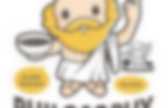

Multiple Intelligences Survey. Multiple Intelligences Inventory Copyright 1999-2017 Walter McKenzie, The One and Only Surfaquarium Note: This is not a test - it is a snapshot in time of an individual's perceived MI preferences.
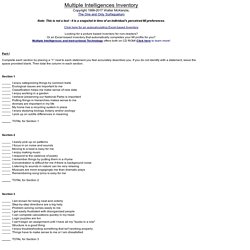
Click here for an autocalculating Excel-based Inventory Looking for a picture based inventory for non-readers? Or an Excel-based inventory that automatically completes your MI profile for you? Part I Complete each section by placing a “1” next to each statement you feel accurately describes you. Section 1 _____ I enjoy categorizing things by common traits _____ Ecological issues are important to me _____ Classification helps me make sense of new data _____ I enjoy working in a garden _____ I believe preserving our National Parks is important _____ Putting things in hierarchies makes sense to me _____ Animals are important in my life _____ My home has a recycling system in place _____ I enjoy studying biology, botany and/or zoology. Philos. Topic8_BTSD. Philosophy and Education Continuum Chart. Emotional Intelligence Test. For decades, a lot of emphasis has been put on certain aspects of intelligence such as logical reasoning, math skills, spatial skills, understanding analogies, verbal skills etc.
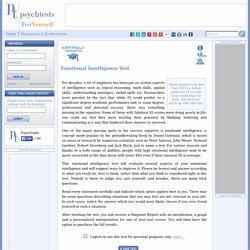
Researchers were puzzled by the fact that while IQ could predict to a significant degree academic performance and, to some degree, professional and personal success, there was something missing in the equation. Some of those with fabulous IQ scores were doing poorly in life; one could say that they were wasting their potential by thinking, behaving and communicating in a way that hindered their chances to succeed. One of the major missing parts in the success equation is emotional intelligence, a concept made popular by the groundbreaking book by Daniel Goleman, which is based on years of research by numerous scientists such as Peter Salovey, John Meyer, Howard Gardner, Robert Sternberg and Jack Block, just to name a few.
Read every statement carefully and indicate which option applies best to you. Birmingham Grid for Learning - Multiple Intelligences (Secondary) Philosophies of Education, Curriculum, Goals & Standards. THE IMPACT OF EDUCATIONAL THEORIES ON EDUCATIONAL PRACTICE. Www3.nd. THE ROSS-BARGER PHILOSOPHY INVENTORY Copyright (C) 1999 by Robert N.
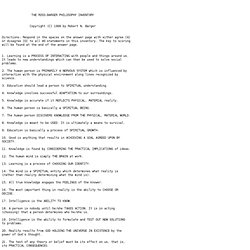
Barger Directions: Respond in the spaces on the answer page with either agree [A] or disagree [D] to all 40 statements in this inventory. The key to scoring will be found at the end of the answer page. 1. Learning is a PROCESS OF INTERACTING with people and things around us. It leads to new understandings which can then be used to solve social problems. 2.
The human person is PRIMARILY A NERVOUS SYSTEM which is influenced by interaction with the physical environment along lines recognized by science. 3. Teaching Philosophy Inventory. October 20, 2009 Adam Johnston A philosophy of education describes our assumptions about learning and its ultimate purpose.
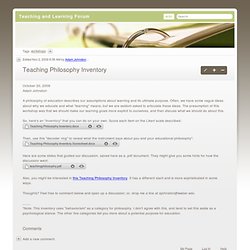
Often, we have some vague ideas about why we educate and what "learning" means, but we are seldom asked to articulate these ideas. The presumption of this workshop was that we should make our learning goals more explicit to ourselves, and then discuss what we should do about this. So, here's an "inventory" that you can do on your own.
Then, use this "decoder ring" to reveal what the instrument says about you and your educational philosophy*: Here are some slides that guided our discussion, saved here as a .pdf document. Are You a Philosophical Teacher?: Philosophic Inventory. Well, here it is, fellow teachers!
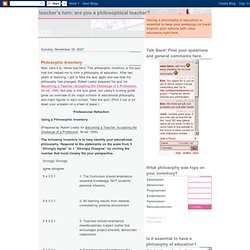
This philosophic inventory is the quiz that first helped me to form a philosophy of education. After two years of teaching, I got to take the quiz again and see how my philosophy had changed. Robert Leahy prepared the quiz for Becoming a Teacher: Accepting the Challenge of a Profession, 3d ed. 1995. Not only is the quiz great, but Leahy's scoring guide gives an overview of six major schools of educational philosophy, and major figures in each school.
Take the quiz! Professional Reflection. PhilEducActivity. (short) Teaching Philosophies Inventory. Four Families Philosophy Survey. This test is originally from the WebPages of Dr.
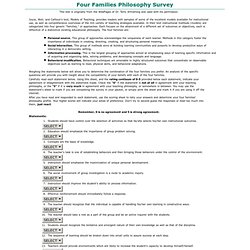
Terry Armstrong and used with his permission. Joyce, Weil, and Calhoun's text, Models of Teaching, provides readers with samples of some of the excellent models available for instructional use, as well as comprehensive overviews of the rich variety of teaching strategies available. In their text instructional methods (models) are categorized into four generic "families," or approaches. Each focuses on the attainment of a different set of outcomes or objectives, each is reflective of a distinctive existing educational philosophy. The four families are: Personal source. Weighing the statements below will allow you to determine the combination of the four families you prefer. Carefully read each statement below. After you have read and responded to each statement, use the scoring sheet to tally your answers and determine your four families' philosophy profile. Remember, 0 is no agreement and 5 is strong agreement. Statements: EDUCATIONAL PHILOSOPHY INVENTORY Survey.
Philosophy Survey 2. What is you Educational Philosophy?
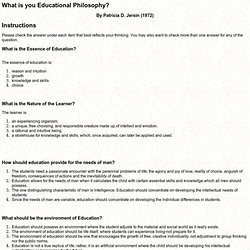
By Patricia D. Jersin (1972) Instructions Please check the answer under each item that best reflects your thinking. You may also want to check more than one answer for any of the question. Education Philosophy Inventory. Task 4. What is Your Philosophy of Education? TPI - Teaching Perspectives Inventory. Teaching Style Survey.